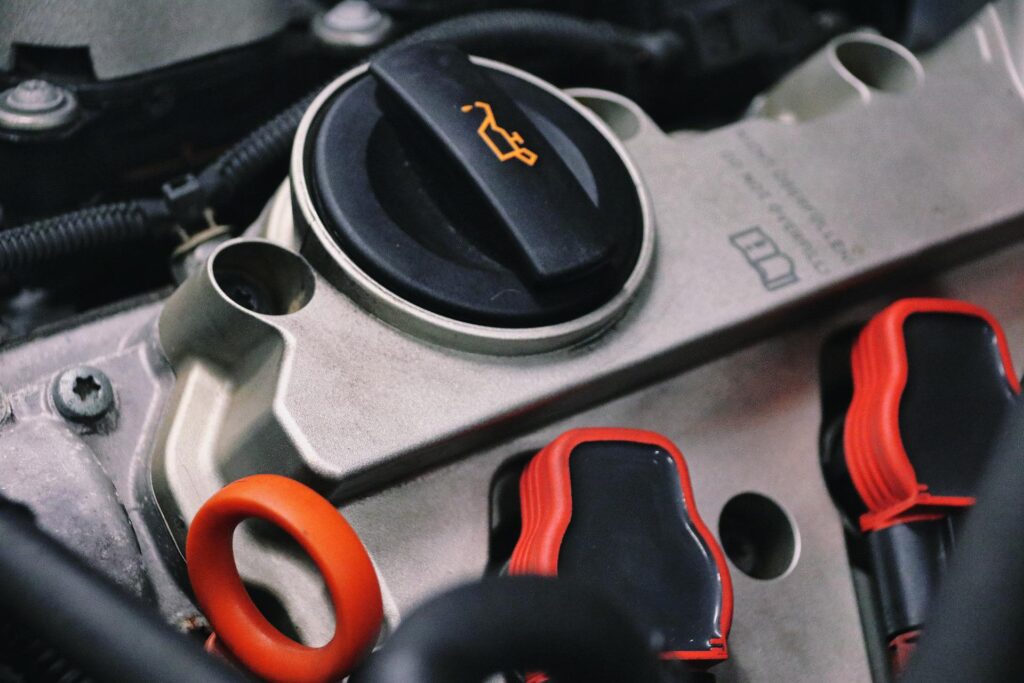Every car needs oil in its engine. A regular oil change ensures you always have clean oil to keep your vehicle running. But how often do you need to change your oil? Read more to learn the recommended oil change frequency for your vehicle.
The short answer to that question is that it depends. To learn the long answer, read on and find out how often you should change your car’s engine oil. We’ll also answer many other common questions about car oil changes.

How Long Can a Car Go Without an Oil Change?
In many people’s minds, “How often should I change the oil in my car?” and “How long a car can go without an oil change?” are the same question. But that’s not quite right.
Your car can probably keep running for a long time past the recommended time for an oil change. but neglecting the oil change frequency may lead to damage and issues with your car’s internal parts. This is the reason why you should get your vehicle oil changed regularly.
The rule of thumb used to be to get your oil changed every 3,000 miles. With modern engines and engine oils, this recommendation doesn’t necessarily hold anymore. Presently, there are two distinct recommendations for oil change frequency based on the age of your vehicle.
Old Car Oil Change Frequency
Older vehicles without modern oil monitoring systems should follow the old standard. Owners of old cars should consider an oil change every 3,000 miles or six months, whichever comes first.
It may well be that such frequent oil changes err on the side of being cautious, but it’s better to be safe than sorry. As your car’s engine starts changing, it becomes more and more prone to malfunction. Giving the senior mile-muncher fresh oil is the least you can do.
With all that said, modern synthetic oils can extend the oil change intervals even on old cars. For complete safety, refer to your car’s owner’s manual for the recommended oil change frequency.
New Car Oil Change Frequency
New cars — that is, cars made in the last 5 or so years — have advanced oil monitoring systems. These sensors will notify you on your car’s instrument panel when you need an oil change. Current oil monitoring systems even take changing driving habits into account.
However, it’s important not to blindly rely on your car’s computer to dictate the oil change frequency. In general, new cars need an oil change every 7,500 miles or six months, whichever you hit first. Some brand-new engines using all-synthetic oil can go even 15,000 miles without an oil change.
And — like with old cars — if you’re in doubt about how often you should address the oil change frequency in your car, refer to your owner’s manual for guidance.
Why Do Cars Need Oil Changes?
We already mentioned that running your car with dirty oil can cause damage to your engine. Yet, that’s only one problem you’re likely to face. Failing to address your car’s engine oil change frequency regularly can lead to a variety of problems, including:
- Poor Engine Performance: Oil lubricates your engine’s moving parts, which reduces friction and helps them move. Dirt in your oil will slow down your engine, forcing it to work harder to put out the same amount of power.
- Lower Mileage: As dirty oil makes your car work harder, it will also burn more fuel. As a result, you’ll have to visit the pump more often and spend more money on gas.
- Shorter Engine Life: Dirty oil increases friction between parts. As a result, the parts will wear down faster. The high friction could also cause your engine to overheat.
Higher Emissions: Old oil can start burning in your engine and produce toxic and harmful emissions. In the worst-case scenario, these emissions could cause your car to fail its annual emissions inspection.
How Do You Know Your Car Needs an Oil Change?
Even when you get your car’s oil changed regularly, your vehicle could still run into oil issues. Mechanical failures or regular wear could cause your car to burn through engine oil faster than usual. That’s why it’s good to be aware of the most common signs that indicate you need an oil change.
If you notice any of these 6 signs, consider bringing your car in for an oil change service:
- Loud Engine Noise: Oil lubricates the parts in your engine and keeps them running smoothly. Grinding or knocking sounds could indicate your oil is dirty.
- Falling Mileage: Are you getting fewer and fewer miles out of your car with every tank? It could be a sign that your engine is working harder than it needs to due to poor oil quality.
- Shaking While Idling: High friction from poorly lubricated engine parts can make your car shake or vibrate. This effect will be particularly noticeable while your car is idling.
- Excessive Exhaust: Modern vehicles should produce next to no visible exhaust. If you notice your car belching out smoke or fumes, your old engine oil could be burning.
- Ticking Noise During Ignition: Your car begins circulating oil through the engine immediately when you start it. If your oil is dirty or old, your car may need to exert more effort to get the oil moving, which can cause a ticking noise during start-up.
“Check Engine” Light Is On: If the “Check Engine” light on your dashboard is on all the time, don’t ignore it. It could be indicating various engine issues, including the possibility of bad oil, underscoring the significance of monitoring oil change frequency.
Can You Do an Oil Change Yourself?
Of course, you can change your own oil! An oil change is one of the most basic DIY car care jobs you can do. Besides, our technicians are only people — if they can do it, so can you.
However, changing your oil isn’t just a matter of draining the old oil and dumping in the new oil. You have to make absolutely sure you’re using the right kind of oil. Otherwise, you might risk voiding your car’s warranty or even breaking your engine.
You also need to dispose of the used oil properly. Not only is it toxic, but you may also get a fine or even go to jail for recklessly dumping old oil. Recycling used motor oil is the most environmentally-friendly option to get rid of it.
If you doubt your mechanic’s skills, the safest choice is to bring your car in for a professional oil change. But here are some tips on how to change the oil in a car, maintaining awareness of the necessary oil change frequency.
How Do You Know What Type of Oil to Use?
There are many different motor oils out there and it’s vital that you use the right type in your car. The most critical feature of the oil is its viscosity or thickness. If the oil is too thin or thick, it won’t circulate properly through your engine.
Additionally, every car has different quality standards for the engine oil they use. Some automakers conform to SAE or API standards, while others go by more obscure standards.
Your vehicle’s owner’s manual will tell you what kind of oil your car needs. It provides information on the oil change frequency, specifying the required viscosity and quality standards that must be met by the oil you introduce into your engine.
How to Change Oil in a Car
We can’t tell you exactly how to change the oil in your car, since different makes and models have a different engine and part configurations. These are the basic steps to a DIY oil change:
- Check your car’s oil type and buy the right oil.
- Gather your tools, new parts, and other equipment.
- Jack up your car and locate the oil plug.
- Place a leak-proof container under the plug.
- Unscrew the plug and quickly pull it out to drain the old oil.
- After draining, reinstall the plug and change the oil filter.
- Pour new oil into the engine.
- Check the oil level.
- Recycle the old oil

Can You Change a Car Oil Filter Without Draining?
Yes, you can change a car oil filter without draining the oil. The filter usually sits above the oil pan that holds most of your oil, so removing the filter shouldn’t cause much leakage. Whatever oil leaks out is stuff that has gotten stuck in the filter.
Still, some leakage is inevitable. You must prepare a container to catch any spills, just like you would when changing the oil. Also, always check your oil level after replacing the filter.
However, before changing your oil filter without draining oil, you should consider if you need to do it. The filter usually gets replaced with the oil, because if the oil is already degraded, a new filter won’t make it better.
Do Electric Cars Need Oil Changes?
Here’s some good news for EV owners — electric cars do not need oil changes. Electric engines don’t use engine oil in the same way gasoline or diesel engines do, so there’s nothing to change.
Although your electric car may not need oil changes, there are other important fluids in the vehicle. These include transmission lubricants and brake fluids, and they could degrade just like motor oil.
So, no, you don’t need oil changes for your Tesla. But you should still bring it in for an inspection annually to make sure all other fluids are in good condition.
Where Can You Get a Car Oil Change in Chantilly and Warrenton?
You now know how long a car can go without an oil change. You may even have learned how to change your own oil. But if you’re looking to get a professional oil change service in Chantilly and Warrenton, VA, Advanced Automotive is here to help you.
We provide fast, reliable, and affordable oil changes for all car makes and models. While attending to your oil change, we include a complimentary courtesy check for other crucial parts of your car. This additional service is aimed at ensuring your safety on the roads of northern Virginia and emphasizes the importance of maintaining a regular oil change frequency.
 Oil Change Chantilly
Oil Change Chantilly  Auto Brake Repair Chantilly, VA
Auto Brake Repair Chantilly, VA  Fleet Services Chantilly
Fleet Services Chantilly